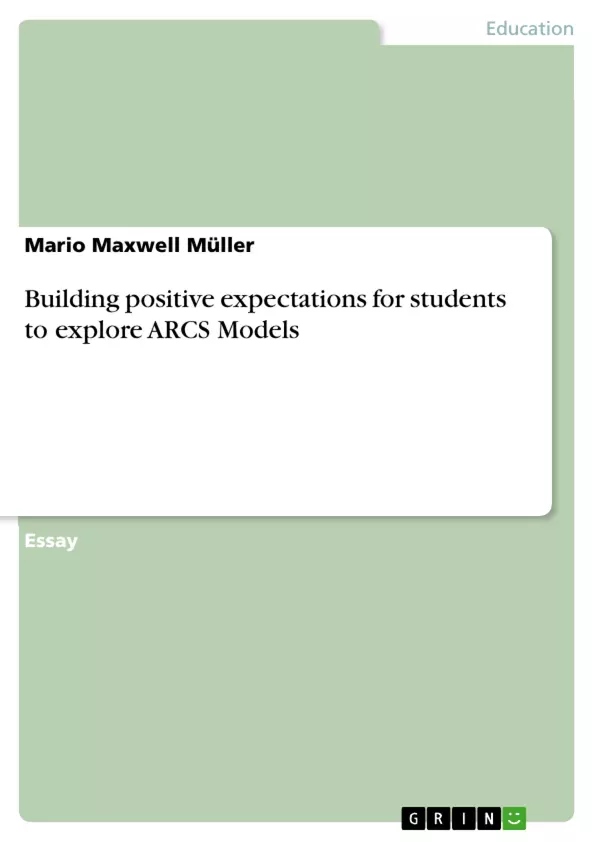This essay will explore building positive expectations for students to explore ARCS models within an international school setting. Focusing on the International Baccalaureate programme and allowing students in the Secondary school to flourish and achieve their goals and targets set for themselves through promoting collaborative projects where students can voice their opinions, share ideas and learn through peer teaching. Actively engaged students are likely to progress and achieve their academic excellence within an international school setting, emphasising the importance of being open-minded and a risk-taker.
Inhaltsverzeichnis
- Introduction
- Focussing on ARCS Model - Attention
- Focussing on ARCS Model - Relevance
- Focussing on ARCS Model - Confidence
- Focussing on ARCS Model - Satisfaction
Zielsetzung und Themenschwerpunkte
Dieser Essay untersucht die Förderung positiver Erwartungen bei Schülern, um ARCS-Modelle in einer internationalen Schulumgebung zu erforschen. Der Fokus liegt auf dem International Baccalaureate-Programm und ermöglicht es Schülern der Sekundarstufe, durch die Förderung kollaborativer Projekte, bei denen Schüler ihre Meinungen äußern, Ideen austauschen und durch Peer-Teaching lernen, ihre selbst gesetzten Ziele und Vorgaben zu erreichen. Aktiv engagierte Schüler dürften in einer internationalen Schulumgebung, die die Bedeutung von Offenheit und Risikobereitschaft betont, akademische Spitzenleistungen erbringen.
- ARCS-Modelle und ihre Anwendung im Bildungsbereich
- Aufbau positiver Erwartungen bei Schülern
- Förderung von Zusammenarbeit und Peer-Teaching
- Die Rolle von Technologie und 21. Jahrhundert-Kompetenzen im Unterricht
- Differenzierung und die Berücksichtigung individueller Lernstile
Zusammenfassung der Kapitel
Introduction
Die Einleitung stellt den Kontext und die Zielsetzung des Essays dar. Es wird betont, wie wichtig die Schaffung einer positiven Lernumgebung ist, um die Schülerengagement zu fördern und sie zu motivieren, ihre gesetzten Ziele zu erreichen.
Focussing on ARCS Model - Attention
Dieser Abschnitt befasst sich mit der Bedeutung von Aufmerksamkeit im ARCS-Modell und erläutert, wie Lehrer die Aufmerksamkeit der Schüler durch verschiedene Ansätze, wie z. B. inquiry-based learning und die Einbeziehung von Technologie, aufrechterhalten können. Es wird betont, dass die Differenzierung im Unterricht und die Berücksichtigung der individuellen Lernstile der Schüler unerlässlich sind.
Focussing on ARCS Model - Relevance
Dieser Abschnitt beleuchtet die Relevanz des Lernstoffs für die Schüler und die Wichtigkeit, ihre Bedürfnisse zu erfüllen. Es werden verschiedene Differenzierungsstrategien vorgestellt, die dazu beitragen, alle Schüler im Unterricht zu erreichen, einschließlich derer, die Englisch als zusätzliche Sprache lernen.
Focussing on ARCS Model - Confidence
Dieser Abschnitt konzentriert sich auf die Förderung von Selbstvertrauen bei Schülern und erklärt, wie Lehrer positive Erwartungen an den Erfolg der Schüler fördern können. Die Bedeutung von Lob, realistischen Erwartungen und einem Wachstumsmindset wird hervorgehoben.
Schlüsselwörter
Die wichtigsten Schlüsselwörter und Themenschwerpunkte des Essays sind ARCS-Modelle, positive Erwartungen, Kollaboration, Sekundarstufe, Differenzierung, Technologie, 21. Jahrhundert-Kompetenzen, inquiry-based learning, und das International Baccalaureate-Programm.
Häufig gestellte Fragen
Was ist das ARCS-Modell in der Pädagogik?
Das ARCS-Modell steht für Attention (Aufmerksamkeit), Relevance (Relevanz), Confidence (Selbstvertrauen) und Satisfaction (Zufriedenheit) und dient der Motivationssteigerung beim Lernen.
Wie fördert man positive Erwartungen bei Schülern?
Durch realistisches Lob, die Förderung eines Wachstumsmindsets und das Setzen klarer, erreichbarer Ziele wird das Selbstvertrauen der Schüler gestärkt.
Welche Rolle spielt Peer-Teaching in internationalen Schulen?
Peer-Teaching fördert die Zusammenarbeit, ermöglicht den Austausch von Ideen und stärkt die soziale Kompetenz sowie das Verständnis des Lernstoffs.
Was bedeutet „Inquiry-based Learning“?
Es ist ein forschendes Lernen, bei dem Schüler durch eigene Fragen und Untersuchungen Wissen aktiv aufbauen, anstatt es nur passiv aufzunehmen.
Warum ist Differenzierung im Unterricht so wichtig?
Differenzierung stellt sicher, dass alle Schüler – unabhängig von ihrem Lernstil oder ihren Sprachkenntnissen – optimal erreicht und gefördert werden.
- Quote paper
- Dr. Mario Maxwell Müller (Author), 2022, Building positive expectations for students to explore ARCS Models, Munich, GRIN Verlag, https://www.grin.com/document/1292414



